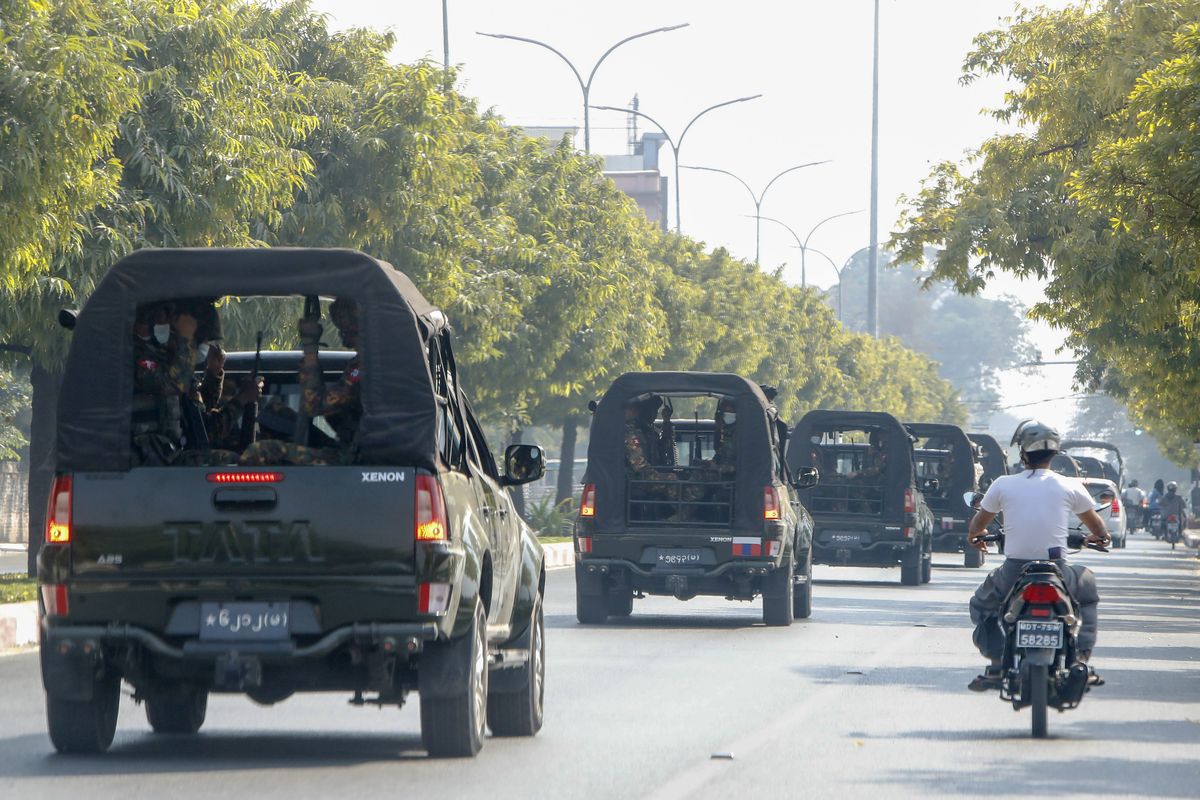Myanmar charges Suu Kyi, giving legal basis to detain her

YANGON, Myanmar — Myanmar authorities charged the country’s deposed leader, Aung San Suu Kyi, with possessing illegally imported walkie-talkies, her allies said Wednesday, a move that gives the generals who overthrew her legal grounds to detain her for two weeks.
The charge came to light two days after Suu Kyi was placed under house arrest and appeared to be an effort to lend a legal veneer to her detention, though the generals have previously kept her and others locked up for years.
The military announced Monday that it would take power for one year — accusing Suu Kyi’s government of not investigating allegations of voter fraud in recent elections. Suu Kyi’s party swept that vote, and the military-backed party did poorly.
National League for Democracy spokesman Kyi Toe confirmed the charge against Suu Kyi that carries a maximum sentence of three years in prison. He also said the country’s ousted president, Win Myint, was charged with violating the natural disaster management law. A leaked charge sheet dated Feb. 1 indicates they can be held until Feb. 15.
“It was clear that the military were going to look for some legal cases against the leaders of the National League for Democracy and especially Aung San Suu Kyi to actually legitimize what they’ve tried to do,” said Larry Jagan, an independent analyst of Myanmar affairs. “And that is really a power grab.”
Police and court officials in the capital Naypyitaw could not be contacted.
While authorities were working to keep Suu Kyi in detention, hundreds of lawmakers who had been forced to stay at government housing after the coup were told Wednesday to leave the capital city within 24 hours and go home, said a member of Parliament from Suu Kyi’s party who is among the group. He spoke on condition of anonymity because he feared drawing the military’s attention.
Journalists saw lines of cars, with the lawmakers inside, leaving the heavily guarded compound on Wednesday afternoon.
The coup was a dramatic backslide for Myanmar, which had been making progress toward democracy, and highlighted the extent to which the generals have ultimately maintained control in the Southeast Asian country.
In response to the coup, Suu Kyi’s party has called for nonviolent resistance, and residents in Yangon, Myanmar’s largest city, honked car horns and banged on pots and pans in a noisy protest for a second consecutive night Wednesday. Supporters of the military have also staged demonstrations.
Medical workers have also declared they won’t work for the new military government in protest of the coup at a time when the country is battling a steady rise in COVID-19 cases with a dangerously inadequate health system. Photos were shared on social media showing health workers with red ribbons pinned to their clothes or holding printed photos of red ribbons.
Protests against the coup occurred in Japan as well as in neighboring Thailand, where Khin Maung Soo, a Myanmar national, said Wednesday that he was demonstrating to “show the world that we are not happy with what happened.”
He added: “We want the whole world to help us too.”
The takeover marked a shocking fall from power for Suu Kyi, a Nobel Peace Prize laureate who had lived under house arrest for years as she tried to push her country toward democracy and then became its de facto leader after her party won elections in 2015. Suu Kyi had been a fierce critic of the army while in detention, but as a politician, she worked with the generals and even defended their crackdown on Rohingya Muslims.
That shift damaged her international reputation, but Western governments have made clear they consider her the country’s legitimate leader and Monday’s takeover a coup.
“We call on the military to immediately release them all and detained civilian and political leaders, journalists and detained human rights activists and to restore the democratically elected government to power,” U.S. State Department spokesman Ned Price told reporters in Washington.
The foreign ministers of the Group of 7 leading industrial nations issued a statement making similar calls Wednesday, a day after the U.N. Security Council met over the matter. In an interview on Washington Post Live, U.N. Secretary-General Antonio Guterres said the United Nations would work with key international players “to put enough pressure on Myanmar to make sure that this coup fails.”
In Myanmar, the leader of the new government said it planned to investigate alleged fraud in the November elections, a state newspaper reported. While the military has cited the government’s failure to properly investigate alleged voting irregularities as its reason for the coup, the state Union Election Commission had found no evidence of fraud.
Analysts say the landslide victory of Suu Kyi’s party may have surprised the generals — and made them concerned that the party had too much power, even though the military-drafted 2008 constitution ensured it would retain significant control, including with an allocation of 25% of the seats in Parliament.
The state-run Global New Light of Myanmar newspaper also reported that Senior Gen. Min Aung Hlaing, the top leader of the new military government, said coronavirus containment measures taken by Suu Kyi’s government would be continued.
Myanmar has confirmed more than 140,600 cases of COVID-19, including some 3,100 deaths. Its health care infrastructure is one of the weakest in Asia, according to U.N. surveys.
A statement issued Wednesday in the name of the executive members of Suu Kyi’s party said that authorities began raiding the party’s offices in Mandalay and other states and regions on Tuesday and seized documents and laptop computers.
The statement on the Facebook page of party spokesman Kyi Toe said locks were broken at several offices. It denounced the raids as illegal and demanded that they stop.